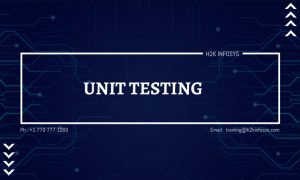Introduction
The world of software development is evolving faster than ever, and with it, the expectations for quality, speed, and innovation have risen dramatically. As businesses rush to deliver new features and digital experiences, software testing stands as the gatekeeper of reliability and user satisfaction. However, traditional testing methods alone can’t meet the demands of continuous delivery, cloud-native architectures, and AI-driven products.
To thrive in this new digital era, companies and QA professionals must adopt future growth strategies in software testing that emphasize automation, intelligence, scalability, and collaboration. These strategies not only ensure better quality but also position organizations for long-term success in a rapidly shifting technological landscape.
In this blog post, we’ll explore the future growth strategies in software testing, and how learners, professionals, and enterprises can adapt to maintain a competitive edge. We’ll also highlight how QA software testing courses empower the workforce to keep pace with industry demands.
Why Future-Proofing Testing Matter
1. Accelerated Software Delivery Cycles
Today’s applications must be released faster, more frequently, and with zero tolerance for errors. Testing must keep up with these demands through automation, intelligent testing, and seamless integration within development pipelines.
2. Digital Transformation & Customer Expectations
Businesses undergoing digital transformation require robust quality assurance. Customer experience is paramount, and any glitch can lead to churn or brand damage.
3. Cybersecurity Threats
Security is a growing concern, especially in fintech, healthcare, and e-commerce. Integrating security within the testing process (DevSecOps) is a rising trend.
4. Cloud and Distributed Systems
As applications move to the cloud, testing strategies must adapt to include cloud-native testing, scalability assessments, and performance monitoring.
Embrace Test Automation
Automation is a cornerstone of modern QA. Repetitive tasks, regression tests, and smoke tests can all be automated for speed and accuracy.
Benefits of Automation:
- Speeds up testing cycles
- Enhances test coverage
- Reduces manual errors
- Supports continuous integration pipelines
Key Tools:
- Selenium
- Cypress
- TestComplete
- Appium
- JUnit/TestNG
For aspiring testers, mastering these tools through QA software testing courses can open doors to higher-paying roles and exciting projects.
Integrate AI & Machine Learning in Testing
AI is revolutionizing software testing by enabling:
- Predictive defect analysis
- Intelligent test case generation
- Self-healing automation scripts
- Visual UI testing
AI-driven testing tools, like Testim and Applitools, use machine learning to adapt to UI changes, saving valuable time. By enrolling in quality assurance testing courses, professionals can stay updated on these cutting-edge technologies and how to leverage them in real-world scenarios.
Shift-Left Testing
“Shift-left” means introducing testing early in the Software development lifecycle. Instead of waiting until the end, testing begins during the requirements and design phase.
Benefits of Shift-Left:
- Early defect detection
- Faster time to market
- Reduced cost of bug fixing
- Better collaboration among teams
Incorporating QA online training that teaches shift-left methodologies, such as Behavior-Driven Development (BDD) and Test-Driven Development (TDD), is essential for testers aiming to remain relevant.
Embrace Cloud-Based and Cross-Browser Testing
Testing today’s applications requires covering a wide range of platforms, operating systems, and browsers. Cloud-based platforms like BrowserStack and Sauce Labs allow QA teams to test across multiple environments effortlessly.
Why Cloud Testing Matters:
- Scalability
- Cost-effectiveness
- Simultaneous testing on different devices
- Flexibility for remote teams
Modern QA courses online are increasingly offering hands-on labs on these platforms, making learners job-ready in a cloud-first world.
Prioritize Mobile-First Testing
With more users accessing applications via mobile, testing strategies must be mobile-centric. This includes:
- Native app testing
- Cross-device compatibility testing
- Network condition simulation
- Battery and performance testing
Mobile automation frameworks such as Appium and Espresso are in high demand. Mastering these through QA software testing courses ensures testers can serve businesses targeting mobile audiences.
Security Testing Integration (DevSecOps)
Security testing can no longer be an afterthought. With increasing cyberattacks, security must be built into the testing process.
Popular Security Testing Approaches:
- Static Application Security Testing (SAST)
- Dynamic Application Security Testing (DAST)
- Penetration Testing
- Vulnerability Scanning
Courses that combine QA online training with security testing fundamentals are highly valuable in today’s landscape.
Continuous Testing in CI/CD Pipelines
Continuous testing ensures that testing happens at every stage of the software development pipeline, not just at the end.
Tools Supporting Continuous Testing:
- Jenkins
- CircleCI
- GitLab CI/CD
- Azure DevOps
Modern testers must learn how to integrate test suites into CI/CD pipelines, a skill taught in many QA courses online focused on DevOps alignment.
Soft Skills and Business Acumen
While technical skills are crucial, testers must also develop:
- Analytical thinking
- Effective communication
- Agile collaboration
- Business domain knowledge
Quality assurance professionals who can align testing with business goals are more likely to be valued and promoted.
Upskilling Through QA Courses Online
One of the most effective growth strategies is continuous learning. The rise of QA online training platforms has made it easier than ever to stay updated, learn new tools, and prepare for certification exams.
Benefits of Online QA Training:
- Flexible learning schedules
- Real-world project exposure
- Certification prep (ISTQB, Selenium, etc.)
- Career support and placement assistance
Whether you’re new to QA or looking to upgrade, quality assurance testing courses offer structured learning paths from beginner to advanced levels.
Popular Certifications That Support Career Growth Strategies in Software Testing
Certifications validate your knowledge and help you stand out in job applications. Consider adding the following to your resume:
| Certification | Focus Area |
|---|---|
| ISTQB | Foundational testing principles |
| Certified Agile Tester | Agile methodology testing |
| Selenium WebDriver Certification | Automation with Selenium |
| CSTE (Certified Software Tester) | Industry-standard QA practices |
| CP-SAT | Selenium Automation Testing |
Courses that guide learners toward these certifications are typically included in reputable QA software testing courses online.
Industry Stats and Career Outlook
Let’s take a look at some powerful data that reinforces why future-focused QA strategies matter:
- The global software testing market is expected to reach $70 billion by 2030.
- 90% of organizations are expected to use DevOps by 2026, making continuous testing a must.
- AI in software testing is projected to grow at a CAGR of 15.5% from 2023 to 2030.
These trends show that there is no better time than now to invest in QA online training and future-proof your career.
Real-World Application: Case Studies
Case Study 1: Retail Application Scaling with Automation
A leading U.S. e-commerce platform reduced regression testing time by 60% by integrating Selenium automation and shifting left testing. Their QA team upskilled through online QA courses and implemented CI/CD pipelines effectively.
Case Study 2: Mobile App Startup Leveraging Appium
A fintech startup trained their QA engineers through mobile-specific QA software testing courses. By adopting Appium, they managed to support over 500 Android and iOS devices in just six monthsensuring app quality at scale.
Key Takeaways
- Test automation, AI, security testing, and CI/CD integration are essential to staying competitive.
- Enrolling in QA online training equips testers with the latest skills and tools.
- The future of QA is collaborative, agile, and intelligent—driven by real-time feedback and business-aligned testing.
- Certifications in QA are essential for credibility and long-term career growth.
Conclusion:
The software industry is evolving at lightning speed, and so must your approach to quality assurance. Whether you’re a beginner or a seasoned QA engineer, it’s crucial to adopt future-focused strategies to remain relevant and effective.
QA courses online, QA software testing courses, and comprehensive quality assurance testing courses provide the blueprint for success. By investing in skill-building, adopting intelligent automation, and embracing agile practices, you can ensure your QA career continues to grow and thrive in the years ahead.
Explore structured QA online training from leading institutes to transform your career trajectory in software testing.

























